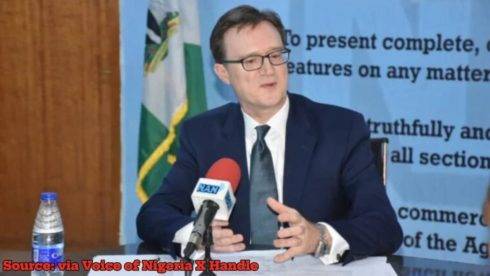British High Commissioner, Dr. Richard Montgomery has highlighted the robust trade relations between the United Kingdom and Nigeria. According to his statements, the trade volume between the two countries has reached an impressive seven billion pounds sterling, underscoring the strong economic ties that exist between them.
This substantial trade volume reflects the diverse range of sectors that contribute to the economic partnership between the UK and Nigeria. From agriculture and creative industries to legal, financial services, and education, the bilateral trade agreement signed by both countries aims to further boost trade and deepen cooperation in these critical areas.
Dr. Richard Montgomery: Post-Brexit Opportunities, Developing Countries Trading Scheme Opens Doors for Nigeria
Dr. Richard Montgomery shed light on the potential opportunities that the Developing Countries Trading Scheme presents for Nigeria in the post-Brexit era. With the UK’s departure from the European Union, this scheme offers Nigeria a unique advantage by removing tariffs on thousands of products, facilitating more seamless trade and fostering economic growth.
The High Commissioner emphasized Nigeria’s vast potential in various sectors, particularly in agriculture. He envisaged immense opportunities for the export of agricultural products like cashews, cotton, and cocoa, urging Nigeria to capitalize on its commercial farming potential and leverage the benefits of the Developing Countries Trading Scheme.
Dr. Richard Montgomery: UK’s Interest in Nigeria’s Creative Industry and Trade Facilitation
Recognizing the vibrant and dynamic nature of Nigeria’s creative industry, Dr. Richard Montgomery expressed the UK’s keen interest in fostering collaboration and growth in this sector. From fashion and film to music and art, the creative industries present a wealth of opportunities for bilateral cooperation and cultural exchange.
Additionally, the High Commissioner offered guidance and support to Nigerian businesses seeking to navigate trade standards and facilitate cross-border commerce. By leveraging the UK’s expertise in business facilitation, Nigerian entrepreneurs and companies can better understand and comply with international trade regulations, ensuring smoother operations and increased market access.
Dr. Richard Montgomery: Reforms in Nigeria Boost Investor Confidence and Economic Prospects
Dr. Richard Montgomery commended the Nigerian government’s recent reforms in various sectors, which have contributed to fostering an attractive investment climate and boosting investor confidence. Specifically, he praised the removal of fuel subsidies, the crackdown on oil theft, improved management of oil revenues, and the implementation of foreign exchange reforms.
These reforms not only demonstrate Nigeria’s commitment to economic stability and transparency but also pave the way for increased foreign investment and economic growth. By addressing longstanding challenges and introducing measures to streamline business operations, Nigeria is positioning itself as an increasingly attractive destination for investors, including those from the United Kingdom.
Dr. Richard Montgomery: Agricultural Exports and Tapping into Nigeria’s Commercial Farming Potential
One of the key areas highlighted by the British High Commissioner is the immense potential of Nigeria’s agricultural sector, particularly in the realm of commercial farming. With its vast arable land and favorable climate, Nigeria has the capacity to become a major exporter of agricultural products like cashews, cotton, and cocoa.
Dr. Richard Montgomery emphasized the importance of tapping into this potential, urging Nigerian farmers and agribusinesses to leverage the opportunities presented by the Developing Countries Trading Scheme. By optimizing production and embracing modern farming techniques, Nigeria can not only meet domestic demand but also exploit lucrative export markets, contributing to economic growth and job creation.
Dr. Richard Montgomery: Fostering Collaboration in Legal, Financial Services, and Education Sectors
The trade agreement between the UK and Nigeria extends beyond traditional sectors, encompassing vital areas such as legal services, financial services, and education. These sectors play a pivotal role in facilitating economic growth, attracting investment, and fostering human capital development.
Through enhanced cooperation and knowledge-sharing in these domains, both countries stand to benefit from each other’s expertise and best practices. Nigerian professionals and institutions can gain invaluable insights from their UK counterparts, while the UK can benefit from the talent and potential of Nigeria’s dynamic workforce. This collaborative approach not only strengthens economic ties but also fosters cultural exchange and mutual understanding between the two nations.
Table of Contents
Discover more from OGM News NG
Subscribe to get the latest posts sent to your email.














